|
|
Features > A tribute to Build > Bob Averill interview
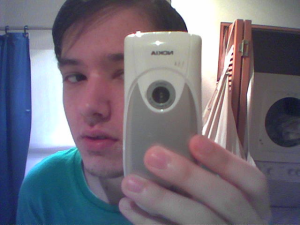 Back in the golden days, he
Back in the golden days, he pumped dribbled out some of the more
detailed and well designed Build maps other there.
You are widely considered as one of the Build community's best mappers. What is it about your maps that separate them from the rest?
I suppose this is where I'm supposed to say "I don't know" in order to "preserve the mystery". The truth is that I just put a hell of alot of detail in there. Back when I was an active mapper my technique was usually to sketch out interesting shapes for rooms, in order to avoid just making a serious of differently sized rectilinear enclosures. I ended up with a bunch of variations in the shape of the rooms. (like the curved room in SP1 that leads to the pump, or the walkway in SP2 that leads to the radar control room) After I had enough room shapes, I would do concept designs for corridors. This led to the skeletal corridors from SP1 and the exposed girder corridors from SP2, amongst others. That's when I would basically throw it all away and fly by the seat of my ass. Sure, I'd use the ideas, but I wouldn't hold myself to any particular layout. Often I'd have a really good idea for a triggered event or effect halfway through and since I didn't set anything in stone I could incorporate it into the map as I went.
I guess that's it. A combination of intentionally unorthodox architecture, and more detail than BUILD was ever meant to have. I am particularly guilty of the latter. Bobsp1 had what, 4 rooms?
How did you find out about the Build engine in the first place?
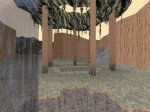 The house area in
BOBDM2 been used
in some Strife
episodes, thanks
to it's careful
and concise
construction.
The house area in
BOBDM2 been used
in some Strife
episodes, thanks
to it's careful
and concise
construction.
I attended a Virtual Reality camp at OMSI when I was but a wee lad. We put together a search and rescue themed TC for Quake which was then displayed publically running on VR setups as an exhibit within OMSI. We were taught level design using Q.E.D. I loved that editor. I still get sentimental thinking about it. Of course I moved onto Quoole when Quake 2 came out, but Q.E.D. will always have a special place in my heart.
I recall that this camp is where my love of level design really took off. I experimented within Q.E.D, creating experiences such as jumping off an enormous skyscraper into a swimming pool, or stepping out of a rocket onto the low-gravity surface of the moon. Mind you, I got to experience these things using what was at the time a state of the art Virtual Reality headset and motion tracking platform. Giving a young man the ability to create a digital world of his own design and then step inside of it is indescribably empowering.
For the scant few weeks that the class lasted, I was never outside of the Virtual Reality helmet unless I absolutely had to be. I spent the entire program translating dreamscapes, sketches and even lego models from the past few years of my life into what seemed to me as tangible worlds, and then playing inside of them. I felt like a god.
Of course looking back on it it's kind of silly. The headsets were VFX-1 units, with a maximum resolution of 640*480. The platforms tracked motion reasonably well but occasionally would flip out and require recalibration. The version of Quake we were using was software accel only, and you could not make a significantly large area without distance clipping issues. I asked the teacher what engine they had been using before, and he told me "Duke Nukem 3D."
Naturally after the first day of camp I set out to Fry's (then called "Incredible Universe" and purchased both a copy of Quake and a copy of Q.E.D. along with the manual. It was there that I spotted Duke Nukem 3D on the shelf with Matt Tagliaferri's level editing guide. Come to think of it, both the Duke Nukem 3D editing manual and the Quake editing manual were written by mister Tagliaferri. Once home I tooled around in Q.E.D. for a bit before playing some Duke Nukem 3D (a new game never sits unopened in my presence)
I was at once astounded by the difference. At the time I placed no importance on Quake's true 3D nature, instead noticing that Duke Nukem 3D's levels seemed to be much larger and "open". I also noticed scripted events such as explosions and deforming sectors not available to me in Quake. I was smitten, and I set out to learn how to edit levels for both games.
Tell me honestly, what was your first attempt at a Duke3D level like? :)
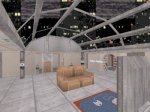 Designed and built specially for This Strife, it's Walters apartment.
Designed and built specially for This Strife, it's Walters apartment.
I didn't really go for a full level right away. I did a whole bunch of small, one-room design studies where I'd try out various effects to make sure I knew how to do them. I went through the whole editing manual like this until I had a good grasp of what I was doing. I recall that some of my earlier maps were actually pretty neat. I made a deathmatch map that involved tubes leading from the edges of an arena to a central clear glass water tank. The cieling was lowered to nearly meet the outerwalkway to that the tube's topside was accessible (through some clever sector work) and each one had a water-filled opening. One could dive in, swim the length of the tube, and end up in the central water tank where you'd be visible (and vulnerable thanks to the splash damage of the RPG) to other players, all for the chance to get the Devastator and swim to an exit.
My first real singleplayer map (also playable in dukematch) was "Road War", a sort of post apocalyptic urban level in which every portion of every wall was SE13 destructible (so that stray rockets in Dukematch would cause damage to the environment) there was a sewer system with entrances/exits that corresponded to manholes on the surface, and several scripted "car comes out of nowhere, crashes into something and explodes spectacularly" events. Despite the level of technical effort that went into all the sector effects, the design and detail were still not up to my standards.
It was after buying the Duke XTreme addon pack that I decided to rethink my mapping philosophy. At that time Quake 2 had come out, and the level of detail in Quake 2 levels impressed me. That, coupled with exasperation from wading through a neverending supply of terrible Duke Nukem 3D levels (and buggy CON hacked addon weapons included on the disc) drove me to try something different.
Instead of churning out undetailed rooms in an effort to get my basic idea laid down as soon as possible, I took things unnecessarily slow. As tedious as it seemed to me, I forced myself to go over each and every room several times, adding detail and shadows until it looked better than anything I had to compare it with. The result was BobSP1.
I am going to tell you something that I have never told anyone before. In the past I have defended the barren nature of BobSP1 with excuses like "The enemies don't mesh with the uncharacteristically high level level of geometric deatil, as they are low resolution sprites." and "I was going for an eerie, lonely vibe". The plain truth is that I was so excited to finally be done with all the detailing that I forgot to add enemies before I uploaded it.
Why do you use the Build engine, why not Unreal or even Doom these days?
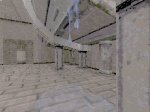 Bobsp1
The story; The story is that while boating off the Coast of Japan,
your boat hit a jagged coral.
You are too far from shore to make it in time, and these
waters are widely reknown for their abundance of Sharks.
Bobsp1
The story; The story is that while boating off the Coast of Japan,
your boat hit a jagged coral.
You are too far from shore to make it in time, and these
waters are widely reknown for their abundance of Sharks.
I do. Or rather I did. I made a number of Quake 2 maps before my inability to make the lighting work the way I wanted it to drove me away from the engine. I toyed around with Unreal Tournament, but I found the editor to be prohibitively unintuitive. My most recent attempt to map in a modern engine was Doom 3, but I didn't get anywhere with that because the editor contained within the game engine (accessed from the console) was a pain to use and the external editors online weren't much better, even using video tutorials from 3DBuzz. I eventually decided that it wasn't worth the effort, as I mapped for my own enjoyment rather than recognition and as such remaining "with the times" was not as important as sticking with an engine that I loved working with. These days I use (and am fairly proficient with) Maya, which allows me to export level geometry to any modern engine of my choosing. In a sense I have retroactively learnt to map for them all. :-)
You've pushed the Build engine to create some unique effects with your maps, which of these are your favourites?
The controllable slope in DM1 (discovered by Chris Allcock), the clear water pools (SP2 and DM2, invented by myself), ladders (Halflife.map) the draining lava silo (SP3) the grabbable motherboard (SP1) The pump mechanism (SP1) the radar and dials/meters in the control room (SP2) and finally the submarine I created for the Critical Mass TC. It used the train sector effect, but most of it was underwater and it momentarily docked with an underwater base's port via water-restraining forcefields that you could step through in order to get on board the submarine. The top of it poked out of the water and its movement in the above water sector was flawlessly synchronized with the movement of the lower portion of the submarine in the underwater sector. In Dukematch it was a sight to behold, as you could see it moving around whether you were swimming on the surface or submerged.
If you could force Ken Silverman at gun point to code one more feature into Build, what would it be?
I'd say polygon objects as the potential for 3D level goemtry via custom models is immense, but we've got that now thanks to Jonof's source port. That said, I suppose what I want most is a full lighting engine, with bump mapping and stencil shadows. I think given the sharp edges of shaded-sector style (manually created) shadows, the sharp Doom 3 style stencil shadows would fit in nicely. Besides, a modern lighting engine tends to make even older games look passable or even attractive by modern standards. (see Tenebrae Quake 1)
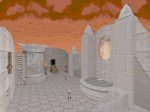 Bobdm1
A detailed, beautiful techno-goth environment inspired by Quake3 and Quake2.
Bobdm1
A detailed, beautiful techno-goth environment inspired by Quake3 and Quake2.
What other mappers from the community do you respect for their work?
First and foremost I would like to name Ikka Keranen. He probably has no idea who I am, but his Quake levels inspired the hell out of me. Within the Quake community I'd have to say that Stranger was my biggest inspiration. I was so taken by the stark, cold beauty of Ruin.map that I would on occasion turn of monsters and simply walk around the map, pretending that I was the last survivor of a terrible war, doomed to roam the desolate, bleak remains of former cities until the end of my life. I really think the only other map to capture that feel was Jungle Tour 3 by Stephano Lessa. The serene, depressing music coupled with the convincingly natural looking caves, pools and snow-covered fields made for a remarkably immersive atmosphere considering the graphical limitations of the engine.
Would you accept a position with 3D Realms as a level designer?
Does every song by Bad Religion sound the same? Absolutely. In my younger and more petulant days, I was a regular at the 3DRealms forums. There was an altercation between Joe Siegler and I through email that I still remember, and I'm willing to bet that he does as well. As I recall he banned me for making a snide comment about the PS2, whereupon I sent him an email in which I likened the scent of his hair to that of cat urine. Since then I have grown older and become wiser. I am now a young man of 22, attending college and studying game design. I live in a one bedroom apartment with my kitten, Jenny. I feel that having compared her leavings with samples of Joe Sielger's hair, I can authoritatively say that it does indeed smell exactly like cat pee.
That said, I have the utmost respect for the man. Not just him, either. I respect George Broussard, Charlie Wiederhold, Lee Jackson, and (to perhaps a disproportionately large extent) Levelord. The entire 3DRealms team, from their Apogee days onward, has done no wrong in my eyes. They are a wonderfully talented group of people with a passion for making great games that I have always done my best to emulate. Truth be told, I'd gladly run a bus full of nuns clear off the road just for a shot at working alongside those guys. That doesn't mean I'll ever get such an opportunity, but a man can dream.
Although it's a bit personal for this sort of interview, I'd like to give credit to members of the community who were good friends to me back when I was into the BUILD scene. Lanna Deones, Chris Allcock, Mortuus, Uncle Tobias, Duckman, Melissa Dark and the creator of JSBuild, which is where I got my start.
Thanks Bob
|
|